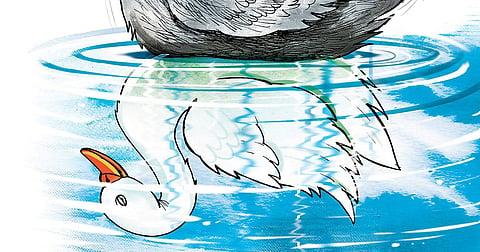

If dark is not beautiful, why do people shed tears when their hair begins to grey?” Thus Radha, in a 19th century folk opera, snubs her friends who discouraged her love for Krishna because he was dark.
The Tripura chief minister who trashed the concept and practice of beauty contests, also said in the same breath that while the choice of ‘A’ as a beauty queen was correct that of ‘D’ was wrong.‘D’ has, as expected, and justifiably, taken offence at his views and believes that this was a reflection on the colour of her complexion that was not fair, even though it represented the common native tint of which she was proud.
We do not know whether the politico’s poor and disgusting reference to an individual’s physical quality was rooted in his colour prejudice or not, but it is a fact that the male kind as a whole and the Indian male (no less the female?) in particular has an embarrassing weakness for the fair skin. It is so deep and so widely prevalent that we have tolerated as uncivilised a TV ad as a woman gleefully confessing before her viewers how her husband who never let her accompany him to the club, now takes her along with a vengeance, for her skin had been metamorphosed from dark to whitish, through the miracle of a cream.
That such ads do not offend our feminist leaders and they do not rush to enlighten our innocent sisters against such unholy confessions is a different issue—an item in our national catalogue of shames. But one thing is certain: our outlook on beauty has speedily and surely been treated to a change for
the dubious.
The male kind’s disinclination towards different shades of dark could be traced to our primitive ancestors’ fear of darkness. That remains deep-rooted in our collective subconscious and only a person culturally evolved, not just informed or even accomplished, can transcend its impact. While the presence of this instinctive deficiency applies to humanity as a whole, added to it is yet another psychological force which dominates the Indian outlook.
The irony is, its role is more prominent on the urban, the educated and the affluent than on the rustic, the illiterate and the poor. It is our awe and reverence, though socially and politically disowned by us, for the white skin that ruled us for more than a couple of centuries and moulded our values in innumerable areas of life, taste and culture. This was inescapable. Let us remember at this point that neither in our ancient nor in our medieval epics and classics was the white complexion an indispensable element of beauty. Several of our epoch-making heroines were of darkish complexion.
Attractive innovations by today’s minds that are gifted and active, but are motivated by commerce and are chained to its service, their imaginativeness competing with one another in inventing trivia of flairs and flamboyance, are continuing to build towers of illusory beauty with our aforesaid weaknesses as the base. Ruthless forces are at work to reconstruct the once delicate notions of beauty, with the growing up generations for their target.
Through the ages our poets and thinkers have left for us countless loving and romantic tributes to beauty. We have also in circulation concepts of beauty that are notoriously cynical, from the popular ‘Beauty is skin-deep’ to the extremely cynical ‘Beauty is sin-deep’ (Saki). In our commonplace conversation the phrase ‘beauty and the beast’ implies opposites. But the beast is beautiful. In fact every species as well as each member of any species has its own harmony and an undistorted harmony is beauty. No human being is ugly but even the physically most well-made face can grow ugly if it gives out vibrations of vicious thoughts. Also, old age does not destroy beauty, it only replaces one shade of it with another, a smart one with a serene one. Hence no need to disturb it with pinchbeck devices, for, “As a white candle/ In a holy place/ So is the beauty of an aged face.” (Campbell)
But even in our present era of dubious constructions of the ideas of beauty, this ruling passion of our emotional life has its chaste incarnation in the sphere of intellect. Bertrand Russell makes a significant observation in his Mysticism and Logic (Ch. 4): “Mathematics, rightly viewed, possesses not only truth, but supreme beauty—a beauty cold and austere, like that of sculpture.”
Mystics assure us that there is an eternal beauty behind the entire creation and that alone is truly objective. What we perceive as beauty is necessarily conditioned by numerous subjective factors. As our consciousness grows or broadens, things that once looked ordinary could assume ever greater degrees of grandeur. Even when an object of art, say Monalisa, has stood the test of centuries and could certainly be called an instance of objective beauty, it has unfolded more and more of its hidden splendours to connoisseurs as their eyes have been better trained to appreciate art, thereby blurring again and again the border between the objective and the subjective.
It is said that Freud killed love. I do not know if it could be said that beauty contests and the beauty industry are in the process of killing the misty (but how blessed!), emotionally oriented approach to beauty. Is it not desirable that at least a few things in life should be allowed to remain a bit mystifying and subjective? Let me remind you of the little girl who got separated from her mother in a festive crowd and was found crying. When asked by some souls to describe the lady so that they could locate her, the little one’s disarming statement was, “Why! My mother, the most beautiful one!”Long live the child’s exclamation that was not based on vital statistics. Its origin was heavenly, unknown to us, things that still support our inner life.